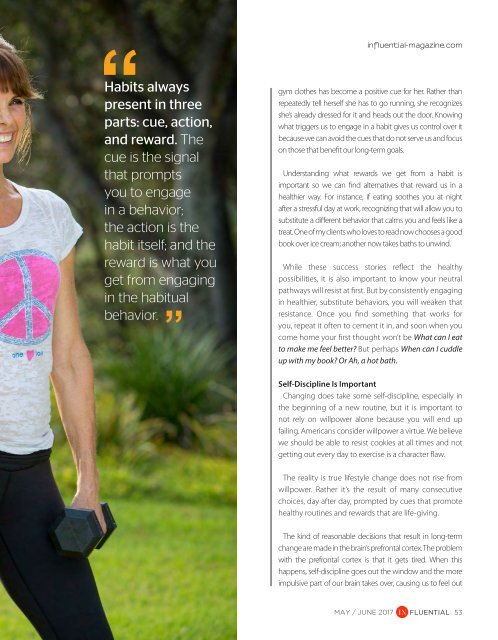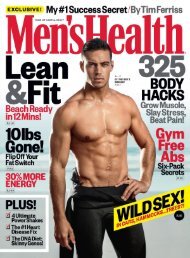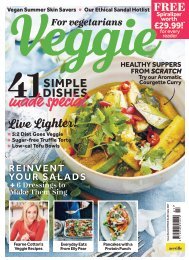InFluential_Magazine_May_June_2017
Create successful ePaper yourself
Turn your PDF publications into a flip-book with our unique Google optimized e-Paper software.
“<br />
Habits always<br />
present in three<br />
parts: cue, action,<br />
and reward. The<br />
cue is the signal<br />
that prompts<br />
you to engage<br />
in a behavior;<br />
the action is the<br />
habit itself; and the<br />
reward is what you<br />
get from engaging<br />
in the habitual<br />
behavior.<br />
”<br />
influential-magazine.com<br />
gym clothes has become a positive cue for her. Rather than<br />
repeatedly tell herself she has to go running, she recognizes<br />
she’s already dressed for it and heads out the door. Knowing<br />
what triggers us to engage in a habit gives us control over it<br />
because we can avoid the cues that do not serve us and focus<br />
on those that benefit our long-term goals.<br />
Understanding what rewards we get from a habit is<br />
important so we can find alternatives that reward us in a<br />
healthier way. For instance, if eating soothes you at night<br />
after a stressful day at work, recognizing that will allow you to<br />
substitute a different behavior that calms you and feels like a<br />
treat. One of my clients who loves to read now chooses a good<br />
book over ice cream; another now takes baths to unwind.<br />
While these success stories reflect the healthy<br />
possibilities, it is also important to know your neutral<br />
pathways will resist at first. But by consistently engaging<br />
in healthier, substitute behaviors, you will weaken that<br />
resistance. Once you find something that works for<br />
you, repeat it often to cement it in, and soon when you<br />
come home your first thought won’t be What can I eat<br />
to make me feel better? But perhaps When can I cuddle<br />
up with my book? Or Ah, a hot bath.<br />
Self-Discipline Is Important<br />
Changing does take some self-discipline, especially in<br />
the beginning of a new routine, but it is important to<br />
not rely on willpower alone because you will end up<br />
failing. Americans consider willpower a virtue. We believe<br />
we should be able to resist cookies at all times and not<br />
getting out every day to exercise is a character flaw.<br />
The reality is true lifestyle change does not rise from<br />
willpower. Rather it’s the result of many consecutive<br />
choices, day after day, prompted by cues that promote<br />
healthy routines and rewards that are life-giving.<br />
The kind of reasonable decisions that result in long-term<br />
change are made in the brain’s prefrontal cortex. The problem<br />
with the prefrontal cortex is that it gets tired. When this<br />
happens, self-discipline goes out the window and the more<br />
impulsive part of our brain takes over, causing us to feel out<br />
MAY / JUNE <strong>2017</strong><br />
FLUENTIAL<br />
53


















